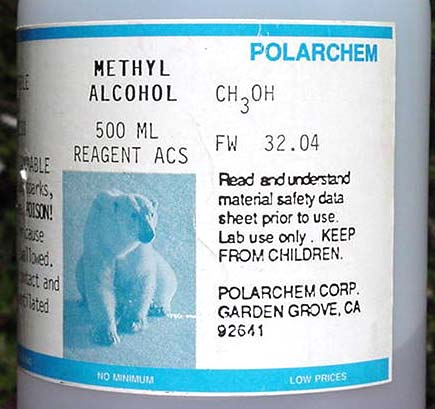Home Search Gallery How-To Books Links Workshops About Contact
How
to Clean Lenses, Monitors, Filters and CCDs Lenses, Monitors and Filters skip to cleaning CCDs The best way to clean a lens is not to get it dirty. I use a prophylactic filter on my lenses all the time, usually an 81A warming or UV. I clean the filters and rarely need to clean the lenses. Avoid cleaning lenses. You can wear off the coatings and scratch the glass. Be gentle and clean as infrequently as you can. This isn't lunch, which should be done early and often. Cleaning lenses is like doing chores or working towards professional advancement: don't do today what you can put off until tomorrow! These techniques work for me for glass. For plastic camera back LCDs, be even more careful. Microfiber Cloths This stuff is amazing. One day I borrowed some gear from a Ph.D. friend. One of the lenses in his bag was wrapped in a cloth, seemingly to keep the lens from banging into the other unprotected lenses. Just for laughs I tried cleaning a fingerprint from a lens with this cloth, and it sucked off the smudge instantly! I was intrigued. I knew this had to be a $60 cleaning cloth that my Ph.D. pal, a researcher curing cancer, had found in some far-off land (he's from China) that had probably come from monks atop a mountain temple. It magically removed all dirt and smudges from multicoated optics and lens barrels without a trace. Even the chemical methods I describe below take a few tries. This magic cloth took one swipe. My friend returned and I returned his gear. I asked him about the magic cloth. It turns out that it was a microfiber towel bought in the automotive department of a chain discount store. The price? Five for $5. We got ours at Target; my wife bought more at Wal-Mart and they work the same. These are fuzzy, like a towel, not flat like a T-shirt. If you're rich, you may prefer the premium 3M 9027 Microfiber Cloth at $4.50 a pop. I'm a cheapskate and will probably try washing these instead of buying new ones at a dollar a pop. They seem to go forever without washing, I've used one for about six months and it works great. I have a lifetime supply for a few bucks, even if I throw them away. My pal simply wrapped it around his lens. I'm paranoid, so I throw mine in a Ziploc and throw it in my bag. I've heard scare stories that bad towels will scratch paint when polishing cars. Supposedly bad towels have some hard fibers hidden in the middle of the cloth; I've never seen these and doubt there's any problem for glass. I only wipe glass with the soft fuzzy part of the towel, not the edge. Quality issues might be an issue for polishing a Duesenberg, but not gently wiping glass. The fibers suck up the oils and knock off and grab the dust by capillary action. Don't use pressure; just be sure the cloth makes good contact. I'd never use these (or anything) for cleaning CCDs. Old Chemical Methods I used to do this before I discovered cheap microfiber towels. To clean a lens or filter I used to breathe on it to coat the lens with a thin fog of pure distilled water. I then wipe it gently with a clean dry soft cotton T-shirt. If I'm out in the field I use a part of my shirt I think is clean, but only if I have a really dirty lens. This cleans off most things that fall on my lenses. I find T-shirts are softer, more absorbent and leave less lint than the special lens paper I used to buy. I'm serious: I photograph outdoors, not in a lab.
Methyl Alcohol If, and only if, I get a deep fingerprint or something else that won't come off with breath will I use something stronger. If I do I'll use 100% Methyl Alcohol, (also called Methanol or Wood Alcohol), UN1230, Reagent ACS Grade, Anhydrous (same as Absolute), Formula Weight (FW) 32.04, CH3OH, CAS# 67-56-1, flash point +12 degrees C. A 500ml bottle cost me $8 in 1991 from a laboratory supply house and I'm still using the same bottle. In 2004 it cost me $50 including shipping. Methanol is poisonous, don't drink it as you would grain alcohol. If you have friends in the drug lab business they have this on tap at work. I had a hard time trying to find it now that I'm running low. Most supply houses are restrictive about selling this "hazardous" chemical, although I asked and it's no more dangerous than rubbing alcohol from the grocery store. I also read it can kill you just by getting it on your skin, so ask someone who knows. Hallelujah! God Bless Google. I clicked on one of the ads to the right which brought me to ScienceLab.com which took my order right over the internet. It seems like they specialize in small science and educational projects like this as opposed to commercial poison, pharmaceutical, chemical weapons and explosives manufacture like other commercial chemical supply places. Here's the link to the right stuff. I find a 500mL bottle lasts a decade. I guess the problem is that big supply houses get orders for all sorts of scarier things and are pickier about to whom they sell. A reader writes that Post Apple Scientific sells it for a lot less. Also try Fisher Scientific. Avoid rubbing alcohol from the discount store: it contains lubricants for rubbing people's skin and those lubricants will stick to your lens. Grade is unimportant. Chemistry places sell many grades including expensive super pure versions for lab use, however even the less expensive commercial grades are fine since the typical impurities evaporate without a trace, too. You just wipe it on and let it dry. I prefer to use a clean old soft cotton T-shirt instead of lens paper. I use it on multicoated lenses and everything glass. I called Nikon and actually got a technician back in 1991 when I asked how to clean the $5,000 600mm lens I had just bought. This is what they suggested, although all the details above are read off the bottle I got years ago when I simply asked for "Methyl Alcohol" at the chemistry store. CCDs and Digital Camera Sensors back to top To be precise we're cleaning the filter in front of the CCD, not the CCD itself. The CCD or CMOS or whatever sensor lies behind filters that prevent color aliases and infra-red problems. Since the two parts don't come apart we can say one or the other, since as photographers we really mean the same thing. Personally my D1H always had specks and my D70 has few if any problems. IN FIVE YEARS OF DSLR OWNERSHIP AND OVER 100,000 IMAGES I'VE NEVER TOUCHED A SENSOR TO CLEAN IT. BEWARE! Avoid cleaning sensors like the plague. I've been shooting DSLRs for years and made probably 50,000 images and have NEVER touched a sensor. I know you guys who read this stuff on the internet love to screw with things because you think after reading a few pages you think you know what you're doing, but don't do it. If you've ever tried to clean a lens and had problems getting it clean in one swipe than you are probably going to destroy your camera trying to clean the sensor physically. If I get a speck and I'm in the field I'll put the camera on BULB and very gently blow on the sensor. Luckily I've not spat on one yet. I have gotten rid of a big speck that way. When home I do what I wouldn't suggest, which is to put the camera on BULB and jam in a Shop-Vac to suck out the dust. Blowers just blow dust around and the Shop Vac vacuums it out. This has worked. I caution you since you also could suck out the camera guts or screw up the mirror doing this. After 17,000 shots I finally got a speck on my D70. Remember I also change lenses a lot. The Shop Vac wasn't enough. This time I used an ear syringe (blower bulb) from the drug store which you can get here. I put the D70 on BULB and pounded the bulb with my fist to create a jarring blast of air. That worked. You gotta love Amazon: I paid close to five bucks at the drug store and at that link you can get it for $3.49! Friends with more guts than myself have successfully wiped their sensors. If you are brave this site here has the best instructions. That site is run by the people from whom I've bought tiny screwdrivers to repair my cameras, as well as repair manuals. These guys supply the camera repair industry so I trust them more than reading this from photo hobbyist chat rooms. You can use the same methanol I describe above, although it's much easier to buy the Eclipse brand. |




